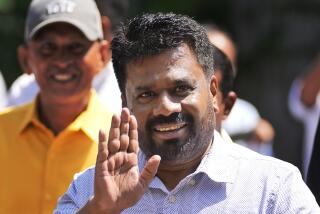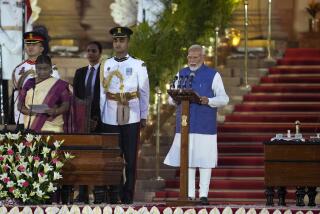New Leader, Old Woes in India
- Share via
National elections in India dealt a stunning defeat to the Congress Party, which had dominated the country since independence, thanks largely to the Nehru-Gandhi dynasty. On Thursday a leader of the Hindu nationalist Bharatiya Janata Party became prime minister.
Election results did not give any party a majority in the lower house of Parliament. There are doubts that Prime Minister Atal Behari Vajpayee will be able to form a coalition to run the world’s most populous democracy. Even if he succeeds, there is no reason to expect his government to break longevity records. The Congress Party has been out of power a total of only four years since India became independent from Britain in 1947. The two previous non-Congress governments did not last long.
Vajpayee represents the moderate face of the BJP, whose more fervid members, with their strident proclamations of Hindu superiority, have heightened the fears of India’s religious minorities. The BJP has also proclaimed the need for a nuclear-armed India, which tested a nuclear device in 1974. Such a development would be a disaster, for surely it would provoke India’s next-door neighbor, Pakistan, to make nuclear weapons. The two nations have fought three wars in the five decades since they became separate upon independence. The carnage from conventional arms was appalling; with nuclear missiles it would be unthinkable.
Vajpayee this week insisted that the rights of all Indians would be respected, regardless of their ethnic background or religious beliefs. Although Hindus represent more than 80% of India’s 930 million people, the Congress Party tried to protect the rights of Muslims and the lowest social classes in what is officially a secular state. There were lapses and periodic religious riots, to be sure, and a loss of confidence in the party by non-Hindus played a part in its defeat.
The BJP has occasionally whipped up xenophobic as well as religious fervor, never difficult in India. On the economic front it welcomes foreign investment for technological purposes but not for consumer outlets like Kentucky Fried Chicken or Baskin-Robbins. It should shun the protectionist route and instead expand on the economic reforms of the newly deposed prime minister, P.V. Narasimha Rao.
Rao will be remembered for unshackling the country’s economy, starting the reversal from the decades of socialistic policy that made India a synonym for inefficiency.
Movement toward a market economy will take time; while the middle class benefited from Rao’s reforms, the poor did not, another factor in the change of governments.
Corruption remains, as always. The indictment of numerous Cabinet ministers not long before the election was a surprising and welcome development in a land where those who are powerful and corrupt usually escape justice.
The next government will need to reassure India’s citizens that they will not be mistreated because of their religion or social standing. It will also need to improve the dialogue with Pakistan and base it on national, not religious, concerns.
More to Read
Sign up for Essential California
The most important California stories and recommendations in your inbox every morning.
You may occasionally receive promotional content from the Los Angeles Times.













